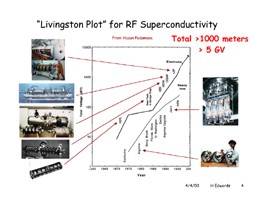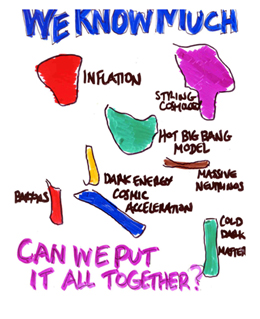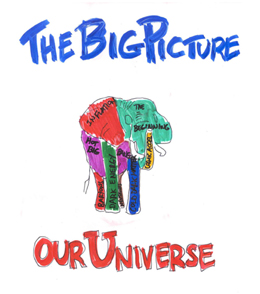 |
|
Meeting Season Physics conferences spread the word on research, and build connections for researchers by Mike Perricone
Though the Illinois weather is hard-pressed to keep pace,the summer physics conference season is heating up quickly.From now through October, those long trails of email correspondence filled with ideas and opinions will now become attached to faces and voices,not to mention plenty of hand waving. “We all need face time with each other,”said Fermilab astrotheorist and David Schramm Research Fellow John Beacom.“That ’s important. That ’s why we don ’t all just work from home in our garages.You can read someone ’s paper from home,but you can ’t listen to them or talk with them.You need the interaction,the direct contact.” Beacom was one of more than two dozen Fermilab presenters at the April meeting of the American Physical Society in Philadelphia,setting up the accelerating summer schedule.In addition to gatherings convening from Italy, Spain and Holland to New York,California and Oregon, Fermilab itself hosted the fourth annual Large Hadron Collider Symposium at the beginning of May,and is looking ahead to its annual Users Meeting in June and to Lepton-Photon 2003 (the 21st International Symposium on Lepton and Photon Interactions at High Energies)in August. For the Users Meeting on Monday,June 2 and Tuesday,June 3,conference organizers have worked to establish a consistent focus on Fermilab ’s future. Chris White of Illinois Institute of Technology,chairman of the Users Executive Committee,issued an invitation to John Marburger,director of the Office of Science and Technology Policy and chief science adviser to the President.Marburger,also the former director of Brookhaven National Laboratory,will speak to the users on Monday afternoon. “Certainly Jack Marburger ’s presence at this meeting will give it a different sense of urgency,”said John Conway of Rutgers University,the main organizer for the gathering.“We have lived with declining funding for over a decade,and the situation in our field,and at Fermilab,is at a real crossroads.”
Conway pointed to the question of whether a new,large accelerator project would take shape,whether it might be placed in the U.S.,and the role it would play in determining the future numbers of accelerator physicists.For the near-term future,while the Tevatron has drawn scrutiny with a slower startup than anticipated,the last several months have seen records set for both initial and weekly integrated luminosity. “The Tevatron program is alive and producing physics,and can do a lot in the coming half decade [before LHC is operating ].”Conway said. “Marburger ’s talk will be in the middle of a session devoted to the Tevatron results,and I have asked the speakers to address the large picture of where we are and where we are going.” The second day of the meetings specifically focuses on the future of the lab,including a presentation by Fermilab Associate Director for Research Hugh Montgomery on the work of the lab ’s Long Range Planning Committee.Conway said there would also be an “open mike ”session where anyone is free to offer views on how the lab should look in the LHC era. “I think this session will be very interesting,” he said.
LHC 2003
A major participant in supplying collider and detector components,Fermilab will also serve as host laboratory for the U.S.collaboration on the Compact Muon Solenoid detector. “The physics programs at the Tevatron and the LHC have a large overlap,”said John Womersley, cospokesperson of Fermilab ’s DZero collaboration. “They will confront many of the same questions, and these same people should talk about the same issues in the same room and then mingle.We all have common interests,but we don ’t always talk together.” Holding the symposium at Fermilab reinforced the LHC connection to the Fermilab experimental community, in addition to reinforcing the U.S. partnership.Visitors were given tours of the lab on the evening before the talks commenced,and there were ample opportunities for informal talks and for running into people in the Wilson Hall cafeteria between sessions in the One West conference room.Among the presentations:an overview of the LHC program from CERN Director of Research Roger Cashmore.Womersley noted a diversity in the audience that was as important as its size. “One West was full,and these were not just ‘the usual suspects ’,”he said. “Many were from outside the LHC collaboration. There were grad students,young postdocs, researchers from both CDF and DZero.LHC represents a large part of their own future,and this is a way to establish a community.In fact, we are the LHC community,and this is the way to build our credentials as members.”
APS Presentations ranged from theorist Joe Lykken on extra dimensions to cosmologist Michael Turner on dark energy,and on connecting quarks to the cosmos;from theorist Chris Quigg on a future linear collider,to Beacom on detecting supernova neutrinos;from Marge Bardeen,head of Fermilab ’s Education Office on involving teachers and students in particle physics research,to experimenter Paul Nienaber on education and outreach efforts on the MiniBooNE short baseline neutrino experiment; from Panagiotis Spentzouris on computing in accelerator physics to Lee Lueking on computing challenges in experimental results;and the prestigious Robert Wilson lecture by Helen Edwards,on RF superconductivity.
LEPTON-PHOTON “One of the differences with this conference is that it features only plenary sessions,”said Fermilab ’s Catherine Newman Holmes,former coordinator for the CDF Run II upgrade project,now a collaborator on the Pierre Auger Cosmic Ray Observatory,and the country coordinator for the U.S.on Lepton- Photon ’03.“There will be about 40 speakers, reviewing progress in different fields.They will certainly include any new results,but they will not only be speaking about their own experiments. By incorporating other work beyond their own, they will try to establish a context for the field and for new developments.” Cynthia Sazama,of Fermilab ’s conference office, anticipates around 800 participants,with more than 500 coming from other countries.While Newman Holmes has been the country coordinator for more than 18 months,other Fermilab scientists such as Joel Butler and theory department head Keith Ellis have been involved even longer in the organizing effort. “This is one of the best chances for a lot of people to get together to review the latest results and the latest plans for future,”said Newman Holmes.
ON THE WEB: LHC 2003 http://conferences.fnal.gov/lhc2003 Lepton/Photon 2003 http://conferences.fnal.gov/lp2003 APS/Philadelphia www.aps.org/meet/APR03/about.html
|



